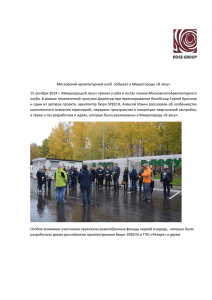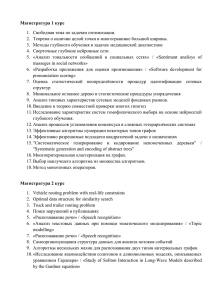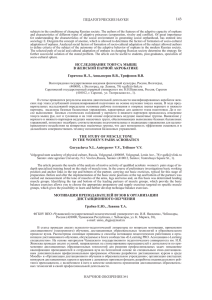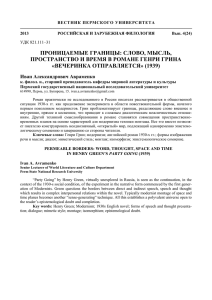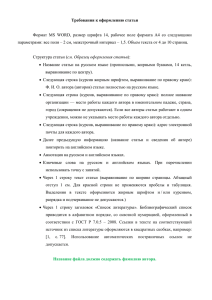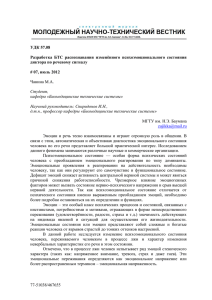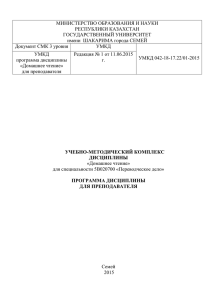Improving the Monologic Skills
реклама
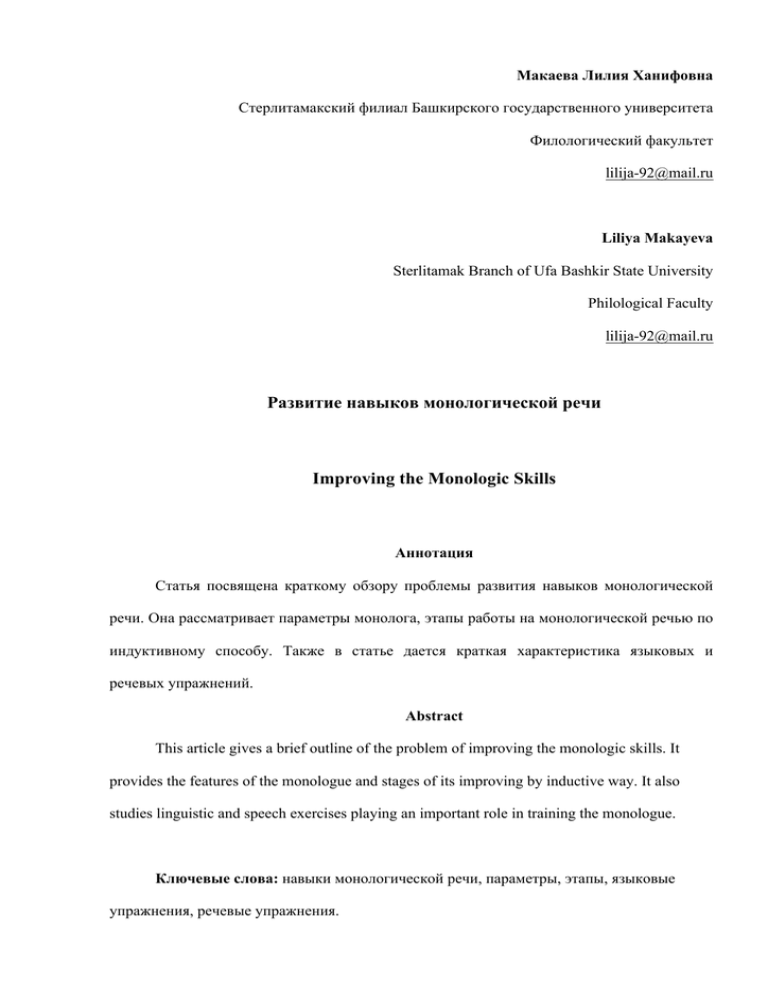
Макаева Лилия Ханифовна Стерлитамакский филиал Башкирского государственного университета Филологический факультет [email protected] Liliya Makayeva Sterlitamak Branch of Ufa Bashkir State University Philological Faculty [email protected] Развитие навыков монологической речи Improving the Monologic Skills Аннотация Статья посвящена краткому обзору проблемы развития навыков монологической речи. Она рассматривает параметры монолога, этапы работы на монологической речью по индуктивному способу. Также в статье дается краткая характеристика языковых и речевых упражнений. Abstract This article gives a brief outline of the problem of improving the monologic skills. It provides the features of the monologue and stages of its improving by inductive way. It also studies linguistic and speech exercises playing an important role in training the monologue. Ключевые слова: навыки монологической речи, параметры, этапы, языковые упражнения, речевые упражнения. Key words: the monologic skills, features, stages, linguistic exercises, speech exercises. The monologue, being one of the main forms of the speech activity, is addressed to an audience (Galskova, Gez, 2007). It can be also addressed to the speaker himself or to another interlocutor. For producing the monologue it is necessary to know not only the vocabulary of the language, its grammar rules, word formation means, but also to be able to express the whole idea of the utterance consistently, according to the plan, coherently and logically correct (Komarov, 2005). One can define the following features of the monologue: continuity, consistency and sequence, semantic completeness and communicative orientation. Teaching students the monologue provides them with the opportunity of building the coherent extended utterances. It is performed in three stages, as it is noted in scientific and methodological literature. The first stage is directed to the development of skills of fluent and correct usage of phonetic, lexical and grammatical material. The second stage is directed to selecting of linguistic means which help to achieve the purpose of communication. On the third stage spontaneous speech skills develop where the main thing is the content of the utterance. In training the monologue linguistic and speech exercises play an important role. Linguistic (or preparatory) exercises include actions with units of the language and form the basic speech skills. There are lexical, grammar, phonetic exercises, forming the appropriate skills. Performing of linguistic exercises draws students’ attention to assimilation of a form, meaning and usage of language units. Speech exercises form speech skills. When students perform them, they concentrate their attention on the content of the utterance. Speech exercises are caused in a situation, they are motivated communicatively, focused on the use of the trained material by students for expressing their own thoughts and understanding other people’s thoughts due to different incentives and motivations. With the help of speech exercises complex mental tasks can be solved, for example, participation in a discussion, justification whether opinions and views are correct or wrong, generation of extended utterances related to the activity of imagination (Методика обучения иностранным языкам: электронный ресурс). Exercises for developing trained speech and exercises for developing improvised speech are referred to speech exercises for improving the monologue. Exercises for developing trained speech are the following: retelling a text, a story, a report, a description, a reference, an assessment of certain actions, a comment. All above mentioned exercises serve for developing improvised monologues except retelling a text (Приемы обучения монологическому высказыванию как продукту речевой деятельности). Linguistic exercises make the basis of speech exercises. Thus, in the process of improving a monologue it is important to define the stages of working at it and to select exercises effectively. Литература 1. Гальскова Н.Д., Гез Н.И. Теория обучения иностранным языкам. Лингводидактика и методика. – М., 2007. – 336 с. 2. Комаров К.В. Методика обучения русскому языку в школе для слабослышащих детей: Учебное пособие для вузов. – М., 2005. – 223 с. 3. Приемы обучения монологическому высказыванию как продукту речевой деятельности. http://festival.1september.ru/articles/559706/ 4. Методика обучения иностранным языкам. http://rudocs.exdat.com/docs/
